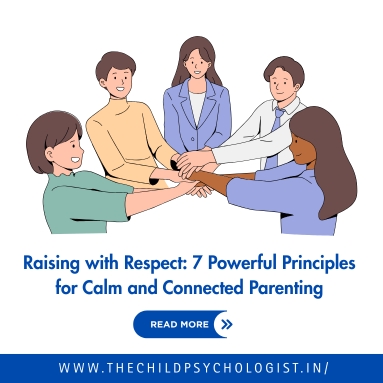By Dr. Vini Jhariya | Child & Clinical Psychologist | Founder, Urjasvini Child Development Center
Every parent dreams of raising a confident, kind, and emotionally strong child. But in reality? Daily tantrums, emotional outbursts, and power struggles can test even the most patient parent.
Here’s the truth: You don’t need to be perfect. What your child needs most is connection, consistency, and calm. At Urjasvini Child Development Center, we use these 7 trusted principles to help parents raise respectful, well-adjusted kids, backed by our experience as a psychological counsellor in Indore.
Why This Matters
Children absorb their behavior from how they’re treated, not just from what they’re told. Respectful parenting lays the groundwork for emotional security, cooperation, and long-term resilience.
When your approach is grounded in consistency and compassion, your child begins to trust—not just you, but themselves too.
7 Principles for Emotionally Grounded Parenting
(With real-life wisdom from parents like you)
1. Respect Builds Respect
Speak kindly. Listen fully. Avoid sarcasm, even in frustration. Kids model what they see.
“When I kneel to Rhea’s level and truly listen, even her meltdowns feel more manageable.” – A parent from our clinic
2. Discipline Teaches—It Doesn’t Punish
Consequences that teach are better than punishments that scare.
Instead of:
“You’re grounded!”
“You chose not to finish your homework, so there’s no screen time tonight.”
This approach aligns with the practice of a therapist specializing in childhood trauma near me, where emotional safety leads to lasting change.
3. Consistency = Comfort
A predictable home environment helps children feel safe. If bedtime is 9 PM today, keep it consistent every day.
Boundaries shouldn’t be based on mood—they should be clear and reliable.
4. Ditch the Bribes—Use Natural Rewards
Let positive behavior lead naturally to privileges, not negotiation.
Example:
Instead of “If you finish homework, I’ll buy you a treat,”
Say, “Once your homework is done, we’ll go for our evening walk.”
5. Open Communication Builds Trust
Create time for regular emotional check-ins. Use moments like bedtime, car rides, or walks to talk.
Open conversations help children feel seen, and more likely to come to you when they’re struggling.
6. Respond, Don’t React
When emotions run high, pause before you speak.
“Timeouts aren’t just for kids. I take them too—especially when I feel overwhelmed.” – A father from our parenting group
Even a moment of calm helps avoid saying things you might regret—and teaches kids self-regulation.
7. Be the Parent They’ll Remember
Celebrate the small wins. Say “I’m proud of you.” Play together. Laugh.
These are the moments your child will carry with them for life.
They don’t remember perfection—they remember presence.
Real-Life Snapshot
“My son Aarav would always backtalk and resist. I started using ‘when–then’ phrases like, ‘When you finish your homework, then we’ll play cards.’ It reduced our battles and brought us closer.” – A parent from Urjasvini CDC
Free Resource
Download our “10 Golden Parenting Reminders”—a fridge-friendly printable for your daily dose of inspiration.
Available exclusively at Urjasvini Child Development Center, Indore
Try Reflecting On:
- When do I tend to lose my calm—and why?
- What’s one boundary I can start enforcing with kindness today?
- How am I modeling emotional regulation for my child?
Final Thoughts
Parenting isn’t about control—it’s about connection.
With warmth, clarity, and patience, your child will not only listen better but feel deeply connected, seen, and supported.
Whether you’re facing power struggles or deeper emotional challenges, a kids therapist near me or a psychological counsellor in Indore can guide you through every stage with empathy and expertise.
